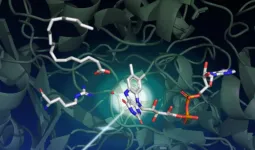(Press-News.org) EUGENE, Ore. -- April 22, 2021 -- Product marketers should be clear in their messaging to avoid customer skepticism that makes them feel duped, according to University of Oregon research.
At issue in a new study, published in the Journal of Business Research, was a social-cognitive construct called theory of mind, which considers how well people assess the mental states and apparent goals of others.
Developmental psychologists link it to an ability to show empathy. In business, the study, led by former UO doctoral student Elizabeth Minton, showed it also can influence a person's recognition of being persuaded. And that affects a person's evaluation and willingness to buy a product, she found.
"There has been some research on adult theory of mind, particularly in understanding sales communications," said co-author T. Bettina Cornwell, head of the Department of Marketing and a Philip H. Knight Chair at the UO. "However, there hasn't been a lot of attention to variations of how it plays out."
In young children, Cornwell said, theory of mind is easily seen. For them, she said, their parent's minds and aspirations are their minds, too. If a child wants a doll for a birthday, then mom does, too. Later a child separates that thinking, realizing that mom may instead prefer perfume or dinner out.
In the project, Minton, now an associate professor of marketing at the University of Wyoming, designed four experiments in collaboration with Cornwell and Hong Yuan, the Richard P. Booth Associate Professor and Research Scholar of marketing and director of the UO's Business Research Institute.
"We wanted to know when the recognition of persuasion becomes particularly important," Minton said. "At what point will a person be misled?"
The first experiment involved a pool of 61 online participants who considered a visual with a character describing "a soap that smells good and is gentle on your hands." A second condition had the additional text, "You HAVE to buy it." Result found that no matter the text in the advertisement, higher theory of mind increased skepticism and, in turn, attitudes toward the product and purchase intentions declined.
Next, 238 subjects were recruited from the customer database of a real company that produces a stevia leaf cocoa syrup. All saw the same general text about the sweetener but across three ads the accompanying visuals changed. One ad had no additional visuals or text, one showed an outline of a girl on a bicycle with a persuasive message, and the last with an added bubble containing persuasive words spoken by the girl.
Again, the pattern of results showed that across the advertising types, theory of mind increased advertising skepticism and, in turn, attitude, purchase intentions and willingness to pay for the product declined.
A third experiment dealt with transparency. An online group of 200 adults saw an advertisement for a limited time offer to get seven packets of seed butter for free but with shipping costs of $10.99. About half of the participants saw the price information on the same page (high transparency) and the rest on a second page (low transparency).
Same-page high transparency produced little skepticism. The delayed low transparency presentation, however, significantly raised flags of skepticism and reduced the subjects' attitudes, purchase intentions and willingness to pay.
"This clearly showed us a sense of transparency that people appreciated," Yuan said. "It tells us that we, as advertisers and marketers, probably need to focus on transparency."
The final experiment, with 215 undergraduate students, considered possible boundaries to how theory of mind influences advertising skepticism as found in the first three studies. Participants viewed one advertisement that was either a private-use item (socks) or a public use item (a graphic T-shirt) with varied text and visuals.
The logic is that because theory of mind is a social processing capability, the researchers said, it might be emphasized in a situation where the product is publicly seen and noticeable.
Skepticism, as in previous experiments, remained high in participants with high levels of theory of mind, but the private-versus-public nature had strong effects. Those showing higher skepticism reported higher valuations for the private products, while participants with lower levels of skepticism showed higher valuation for the public products.
"These findings continue to provide evidence for the importance of understanding theory of mind's influence on response to potential persuasion episodes and the interaction with a product's private versus public nature," the researchers suggest.
The study, Minton said, opens a public policy question about advertising being allowed to potentially persuade people who haven't developed a strong theory of mind.
"It's probably not advantageous for marketers to promote a product in a way that has low transparency and makes a consumer have to work hard to understand the offer," Cornwell said.
"One, consumers who don't have high theory of mind may be duped then frustrated while those who have high theory of mind, and thus more skepticism, will be irritated by the way the offer is presented and be less willing to buy," she said. "Neither of the outcomes is good."
INFORMATION:
A Sheth Foundation Dissertation Award received by Minton in 2013 supported the research.
Links:
Journal of Business Research paper: https://doi.org/10.1016/j.jbusres.2021.02.002
About T. Bettina Cornwell: https://business.uoregon.edu/faculty/t-bettina-cornwell
About Elizabeth Minton: http://www.uwyo.edu/mgtmkt/faculty-staff/faculty-pages/minton.html
About Hong Yuan: https://business.uoregon.edu/faculty/hong-yuan
Lundquist College of Business: https://business.uoregon.edu/
Severity of illness, history of stroke, and being divorced or widowed were independently predictive of delirium in hospitalized patients in Zambia, according to a study published in PLOS ONE.
A collaborative team of researchers from Vanderbilt University Medical Center and the University of Zambia Teaching Hospital published the risk factors as a follow-up look at the prevalence and impact of delirium, a form of acute brain dysfunction, in lower-resourced hospitals. Findings published in February showed delirium is widespread in patients admitted to the University Teaching Hospital, and the duration of delirium predicted both mortality and disability at six months after discharge.
The studies represent ...
PHILADELPHIA -- (April 22, 2021) -- A synthetic DNA vaccine candidate for Middle East respiratory syndrome coronavirus (MERS-CoV) developed at The Wistar Institute induced potent immune responses and afforded protective efficacy in non-human primate (NHP) models when given intradermally in abbreviated, low-dose immunization regimen. A similar vaccine candidate was previously shown to be safe and tolerable with a three-dose intramuscular injection regimen in a recently completed human phase 1 study and is currently in expanded studies of phase 1/2a trial. ...
Although many organisms capture and respond to sunlight, enzymes - proteins that catalyze biochemical reactions - are rarely driven by light. Scientists have identified only three types of natural photoenzymes so far. The newest one, discovered in 2017, is fatty acid photodecarboxylase (FAP). Derived from microscopic algae, it uses blue light to catalyze the conversion of fatty acids, found in fats and oils, into alkanes and alkenes.
"A growing number of labs envision using FAPs for green chemistry applications, because alkanes and alkenes are important components of solvents and fuels, including gasoline ...
For reasons not yet clear, pregnant women infected with the virus that causes COVID-19 are more likely to experience preterm births, pre-eclampsia, and other neonatal problems than non-infected women.
A team of Yale scientists decided to investigate whether the virus could be affecting placental tissue of infected expectant mothers. Their analysis found that while evidence of the virus in the placenta is rare, the placenta in infected mothers tended to exhibit a much higher level of immune system activity than those of non-infected pregnant women, they report April 22 in the journal Med.
"The good news is the placenta is mounting a robust defense against an infection that is far distant, in lungs or nasal tissue," said Shelli Farhadian, assistant professor of internal ...
April 22, 2021--(BRONX, NY)--Researchers at Albert Einstein College of Medicine have designed an experimental drug that reversed key symptoms of Alzheimer's disease in mice. The drug works by reinvigorating a cellular cleaning mechanism that gets rid of unwanted proteins by digesting and recycling them. The study was published online today in the journal Cell.
"Discoveries in mice don't always translate to humans, especially in Alzheimer's disease," said co-study leader Ana Maria Cuervo, M.D., Ph.D., the Robert and Renée Belfer Chair for the Study of Neurodegenerative Diseases, professor of developmental and molecular biology, ...
Soldiers, athletes, and motorists could lead safer lives thanks to a new process that could lead to more efficient and re-useable protection from shock and impact, explosion, and vibration, according to a new study.
Pressurised insertion of aqueous solutions into water-repellent nanoporous materials, such as zeolites and metal-organic frameworks, could help to create high-performance energy absorbing systems.
An international research team experimented with hydrothermally stable zeolitic imidazolate frameworks (ZIFs) with a 'hydrophobic' cage-like molecular structure - finding that such systems are remarkably effective energy absorbers at realistic, high-rate loading conditions, ...
As politics grows increasingly polarized, a new global study finds people often exaggerate political differences and negative feelings of those on the opposite side of the political divide, and this misperception can be reduced by informing them of the other side's true feelings. The study replicates earlier research in the United States, finding the phenomenon to be generalizable across 25 countries.
The new study was led by Kai Ruggeri, PhD, assistant professor of health policy and management at Columbia University Mailman School of Public Health, and replicates a 2020 study by Jeffrey Lees and Mina Cikara at Harvard University, who were also co-authors of the new study. The new findings ...
Stars spin faster than expected as they age according to a new study led by scientists at the University of Birmingham which uses asteroseismology to shed new light on this emerging theory.
All stars, like the Sun, are born spinning. As they grow older, their spin slows down due to magnetic winds in a process called 'magnetic braking'. Research published in 2016 by scientists at Carnegie Observatories delivered the first hints that stars at a similar stage of life as the Sun were spinning faster than magnetic braking theories predicted. The results from this study were based on a method in which scientists pinpoint ...
What The Study Did: This case series reports the risk factors, incidence rate and features of acute ischemic stroke experienced by a group of male patients ages 50 years or younger in the convalescent stage of COVID-19.
Authors: Tian Ming Tu, M.R.C.P., of the National Neuroscience Institute in Singapore, is the corresponding author.
To access the embargoed study: Visit our For The Media website at this link https://media.jamanetwork.com/
(doi:10.1001/jamanetworkopen.2021.7498)
Editor's Note: The article includes conflict of interest disclosures. Please see the article for additional information, including other authors, ...
What The Study Did: This study assesses the association between COVID-19 and maternal and neonatal outcomes in pregnant women with COVID-19 diagnosis compared with pregnant women without COVID-19 diagnosis.
Authors: Aris T.Papageorghiou, M.D., of the University of Oxford in the United Kingdom, is the corresponding author.
To access the embargoed study: Visit our For The Media website at this link https://media.jamanetwork.com/
(doi:10.1001/jamapediatrics.2021.1050)
Editor's Note: The article includes conflict of interest and funding/support disclosures. Please see the article for additional information, including ...




